Paul Poiret ~ 1879-1944
Biography of Paul Poiret fashion designer
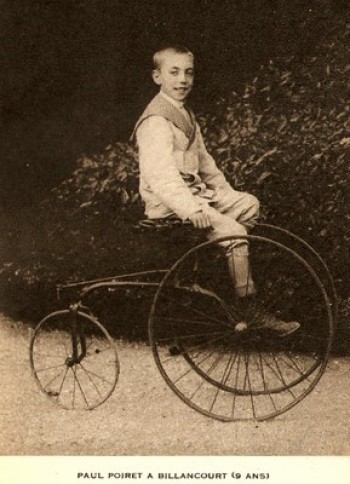
Paul Poiret 10 years old
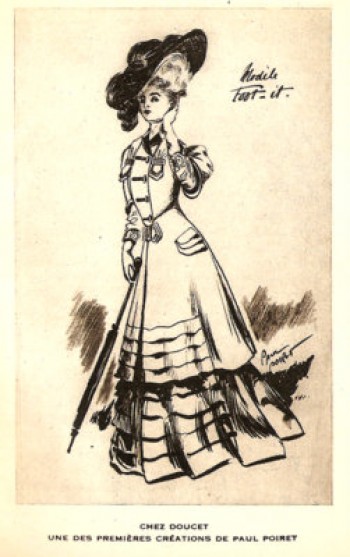
One of Paul Poiret's first creations at Maison Doucet
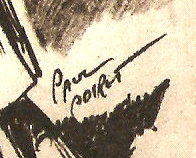
Paul Poiret - signature
1900 – Paris. He was employed at the house of Worth and did not continue for long, as on the 1st September, 1904 he opened his own establishment at 5 Rue Auber. This was financed by his mother.
1905 – He married Denise and she became his source of inspiration. Experimenting with the design of the empire style, which suited her slender frame and slavic features. They had two daughters Rosine and Martine.
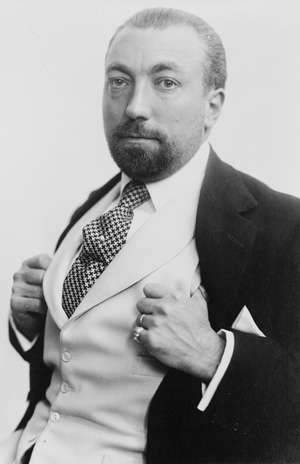
Portrait – Paul Poiret
Between 1904 & 1924 ~ he irrevocably changed the feminine form with his new fashion designs by dismissing the use of corsets and eliminating layered petticoats. He introduced the first modern straight lined dress the beginning of his extraordinary success in the field of Fashion inspiration.
Paul Poiret was a significant exponent of Art Deco commissioning many well known Artists of the time who illustrated his designs. It is also known that he worked with the Artist Raoul Dufy.
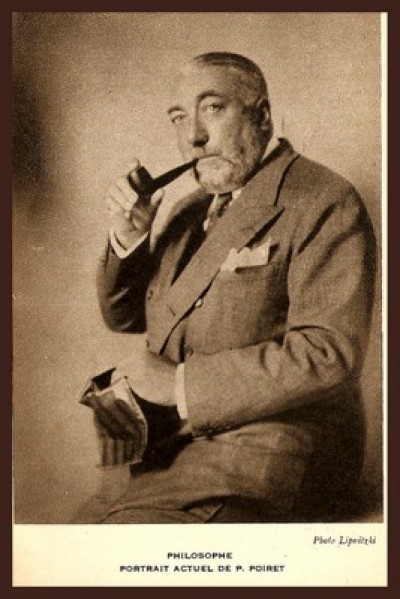
Paul Poiret with his pipe
This Design by Paul Poiret was in an advertisement for Costume Tailleur in the Journal Femina dated 1906, before the Parisian oriental flamboyant craze arrived instigated by Leon Bakst’s costumes for the the Ballet Russes in 1910.
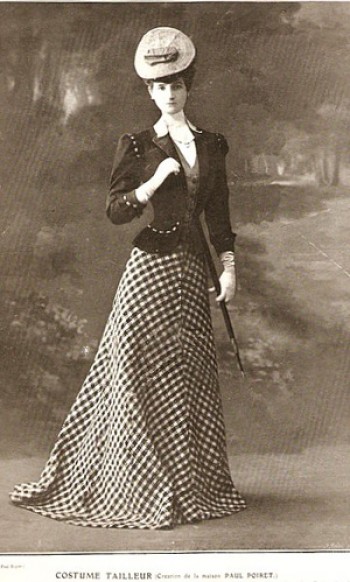
Classic early Paul Poiret 1906
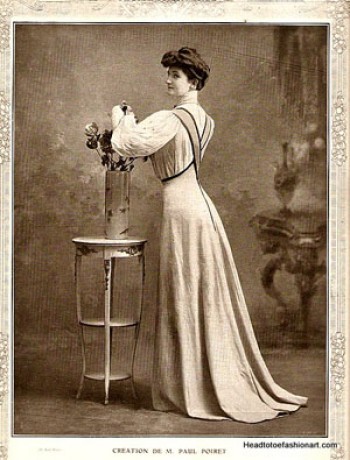
Flower arranging pinafore dress 1906
1908 – He published the first of two albums of fashion designs.
1911 – Paul Poiret had an advertisement for his Fashion House designed by the Artist: George Lepape.
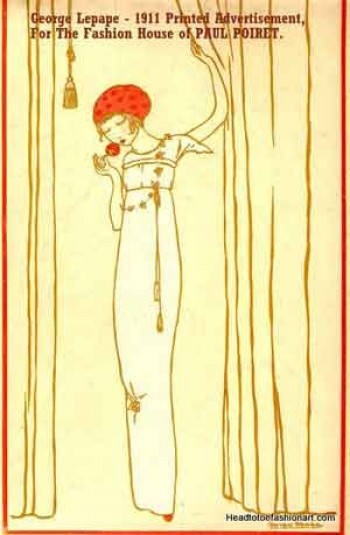
Paul Poiret’s Fashion House Advert 1911
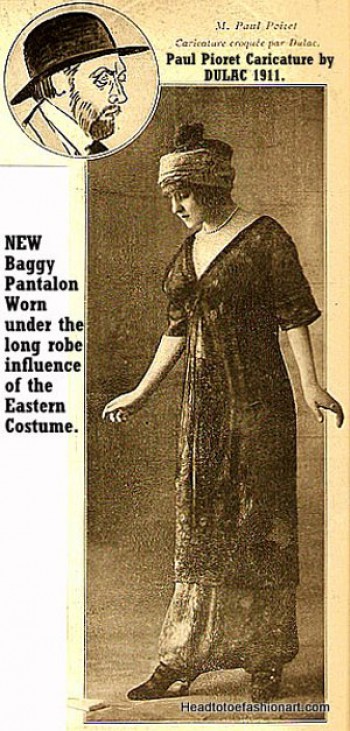
Paul Poiret Caricature by Dulac
Wife of Paul Poiret.
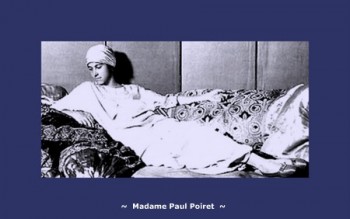
Madame Paul Poiret ~ Denise.
A luxurious rust silk satin cloak in green velvet embroidered flowers.
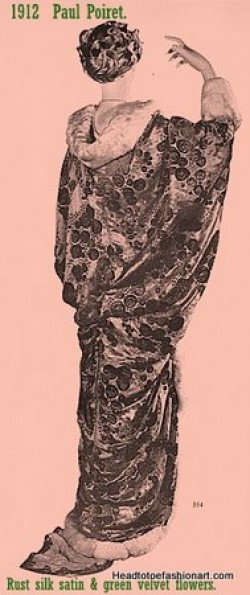
1912 Rust silk satin & velvet green flowers
1913 – Cold snow flakes fall but this lady has a warm pink coat.
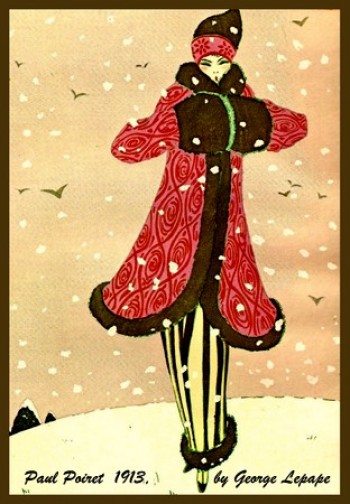
1913 October snow by George Lepape
1914 – He was called up to the front and designed his own uniform.
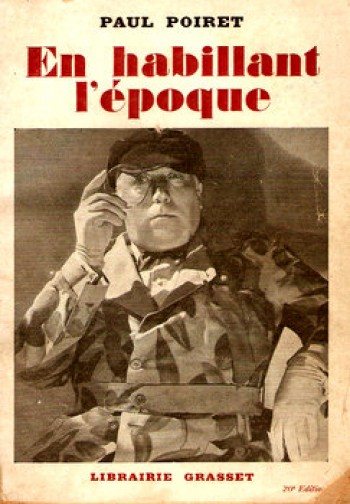
Book Printed 1930
Many of the photographs for this page were found in this amazing aged copy.
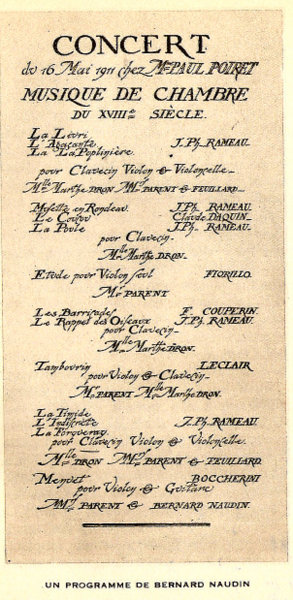
Paul Poiret organised a Chamber Music Concert
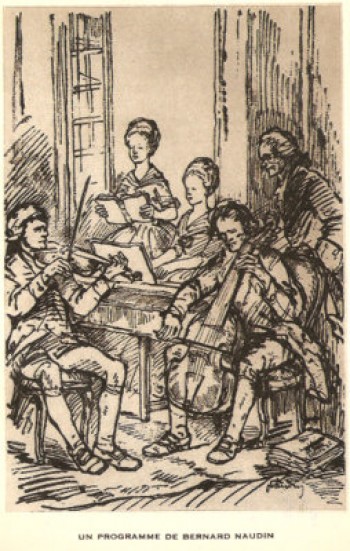
Concert for Paul Poiret's 1002 Nights Party
At the height of the Ballet Russes in 1910, influenced by Serge Diaghilev and Leon Bakst’s extraordinary stage costumes, he became enchanted and bewitched with the treasure troves of Russian, Near Eastern and Far Eastern costume ideas from which he borrowed. In 1911 ~ A European Tour including St. Petersburg was arranged. He was the first Courtier to travel with his models to show his new clothes, and the first to offer a range of perfumes, cosmetics and toiletries named Rosine, (after one of his Daughters). He described Moscow as “The whole phantasmagoria of half-eastern life that is Moscow”.An interior decorating business was also opened offering carpets, divans, drapes, cushions and tasselled lamps, all bearing oriental motifs in exotic bright colours.In 1912 ~ He orchestrated the first Fashion Show. Another outstanding achievement was to open a Design Art School for poor Parisian girls. He named this after his daughter Martine. He used many of their designs and converted them into fabrics for cushions, curtains, rugs, wall coverings as well as garments. Roul Dufy design’s were used fabrics too and both were used for brocades woven with brightly coloured birds, folliage, seashells, and human figures. The Martine school patterns included flowers dahlias, rosebuds, and artichokes they were then beaded and embroidered motifs for gowns and accessories.It is also known that he had a most generous and kind personality. Paul Poiret’s strong character and talent remains a legend in Paris. An Invitation to the Famous Party – design by Artist Raoul Dufy.
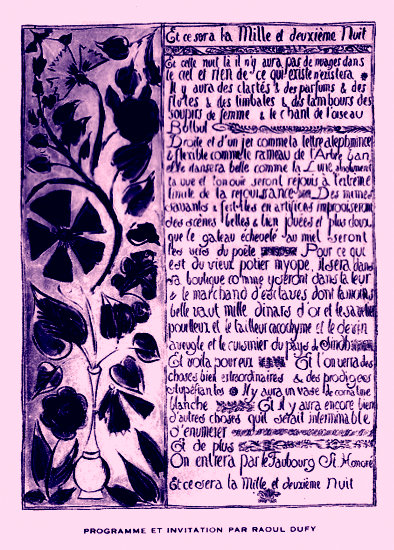
A grand invitation - 1911
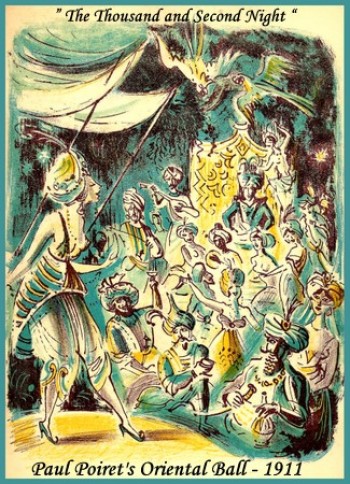
Illustrated by Walter Goetz
A very rare photo capturing the end of his much talked about party in Paris. We think he is seated in the middle. Looks like a lampshade on his head! See enlargment of this below.
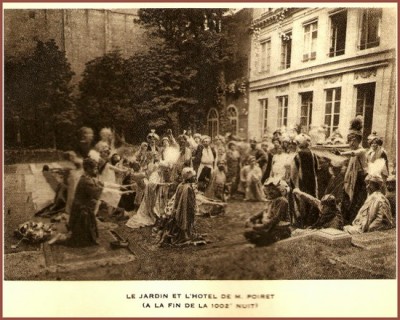
End of the Party 1002 Nights - 1911
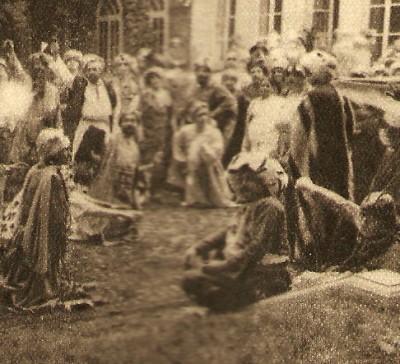
Engarged photo 1911
He hosted the most prestigious revolutionary and extravagant parties in Paris, with his insistence that all his guests were to dress up in exotic costumes.His greatest remembered Ball was thrown in an Eastern theme.From the book Edited by James Laver, and Illustrated by Walter Goetz – called:- ~ Memorable Balls ~ which was printed in 1954, it gives an elaborate interesting story of one of these events.It has many grains of truth giving us an exciting vision of the place and time.An interesting fun exert from this book is:
“A seller of Monkeys walked about among his guests. Orchestras played softly out of sight. Nor were the other senses forgotten, curries cooked behind the scenes added there spicy fragrance. The buffets were loaded with every kind of exotic delicacy and there was also, a dusky bar where only the liqueurs were LUMINOUS.What alchemist had prepared the startling phantasmagoria of this disturbing laboratory… A hundred long-necked carafes, a hundred crystal ewers contained all the beverages whose gamut extends from Violet anisette, garnet bitters, emeralds & crimson of grenadine.Then there was liquorice and almond emulsion, Chartreuse, gins, vermouths, orangeades, kirsches, all showing a palate with these pure tints, which they mixed as they pleased in the transparency of their long glasses. Thus they created mysterious and sinful drinks that were a feast to see and a surprise to drink!”This Exotic Eastern costume Party was held at his transformed House/Salon with hundreds of Artists, Designers, Fashion Houses, and Parisian Elite Society., sometime in 1911.
Another costume for the party? Complete with a false nose!! Photo by Lipnitzki. Boris Lipnitzki was born in Russia in 1897-1971, and then lived in Paris. He was a friend of Paul Poiret photographing his fashion celebration parties, also making connections to photograph many big society events in Paris. This photo is a fascinating character study of Paul Poiret. It may have been taken at a later date than 1911 because Boris would then have only been 14 years old. A vast collection of his photographs coverd many of the great fashion houses. Chanel, Schiaparelli, Maggy Rouff, Molyneaux,Fath, to mention a few. The arts featured in a great number of beautiful photo’s covering ballet, theatre, and music concerts.
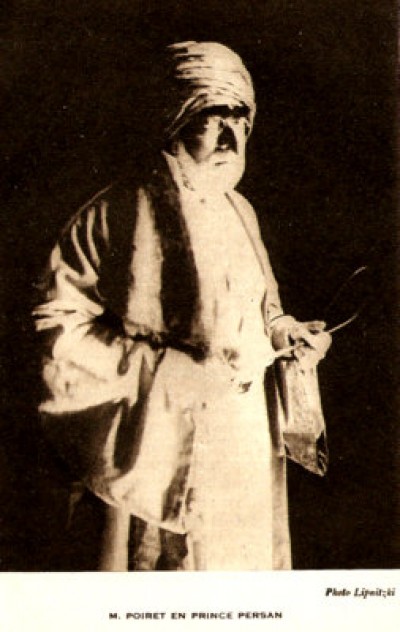
Paul Poiret as a Persan Prince 1911
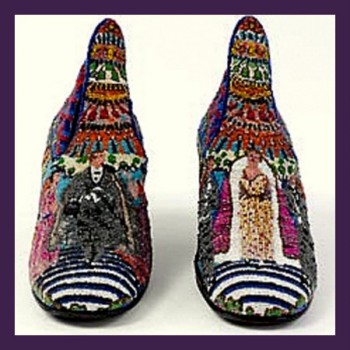
Paul Poiret - Oriental party pumps
This grand ball with 300 guests, must have been a sensational sight when they were all together in a luxurious setting, especially designed by Paul Poiret.
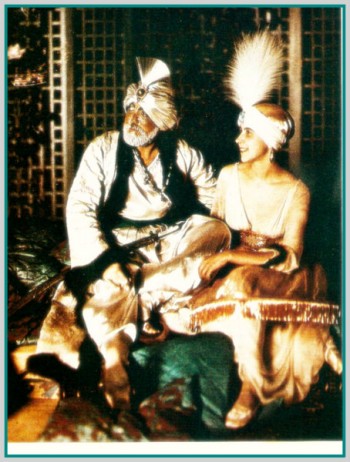
Oriental Party Poiret and his wife
The text for the above image :
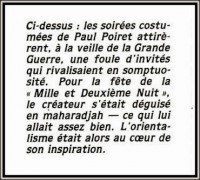
French text
He continued his researches into ancient Sumerian, Persian and Turkish costumes required for his theatrical shows. He also used the simple shapes of kimono jackets, long tunics over trousers, and sari like long scarves
1914 – Design by Paul Poiret and drawn by Simone A, Puget.
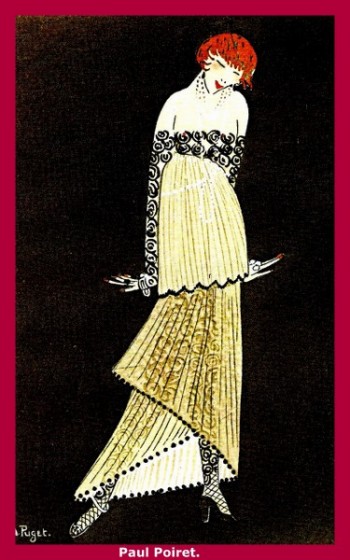
Artist: Simone A Puget
1915 and during 1918 he did no designing. He did create a perfume called Sang de France which was immediately banned by the authorities.
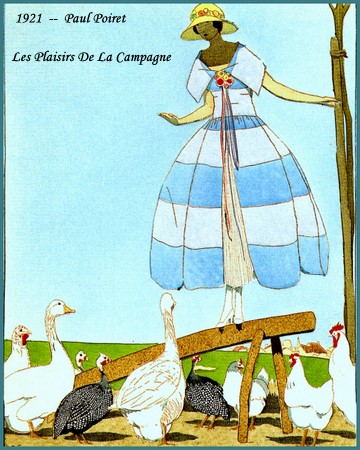
- Gazette Bon Ton
The Three Graces in the designs are dated 1924 and are part of a wider image. They are wearing stunning clothes an Evening Wrap and smart gowns complete with bobbed hair styles.
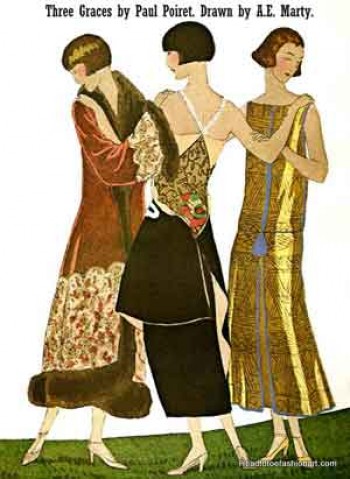
The three graces all by Paul Poiret
1922 – A long red coat.
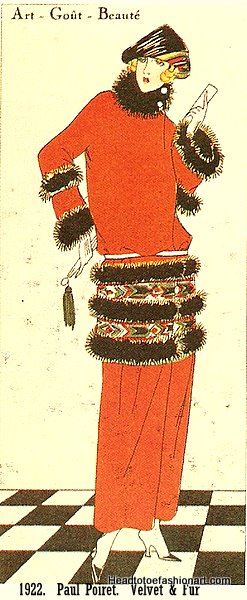
1922 Long red coat with velvet & fur bands
Artist: George Lepape.
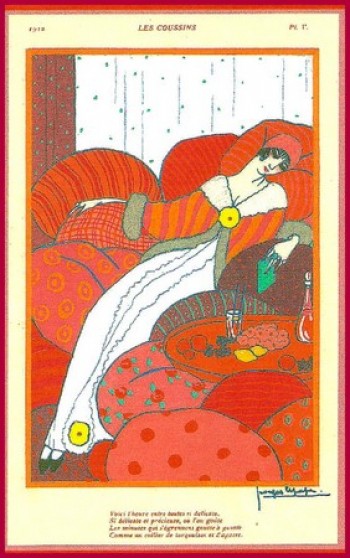
Red cushions by George Lepape
The famous turban worn for Paul Poiret’s eastern clothes.
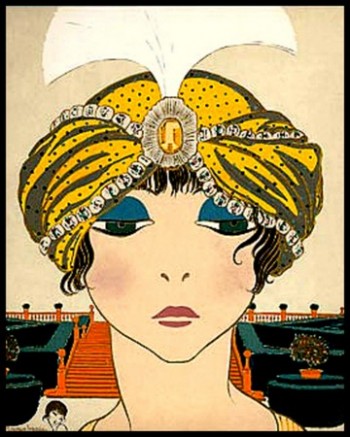
The famous Turban by Paul Poiret
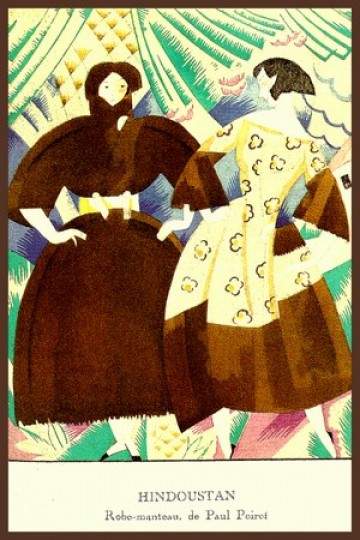
Paul Poiret - Gazette Bon Ton
Our latest image found July 2012.…A black and white photo from L’Illistree.
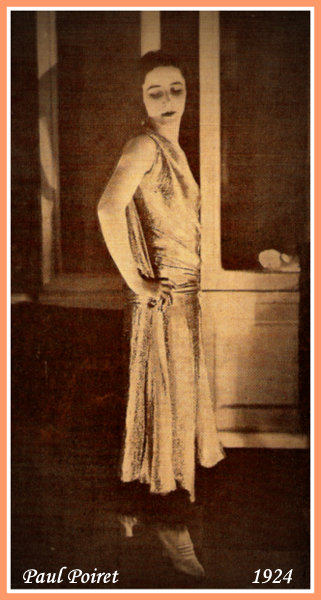
From L'Illustree
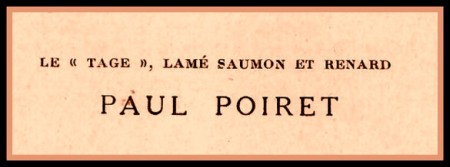
Gown info. 1924
Quote from Paul Poiret – “It was my inspiration of artists, in my dressing of theatrical pieces, that I served the public of my day”
“Am I a fool when I dream of putting art in my dresses, a fool when I say dressmaking is an art?” Poiret believed that an artist was someone who put himself into everything he did and he breathed his passion for fantasy and his rare individuality into each endeavour – writing, printing, theatrical, interior design, schemes for fabrics, perfumes, and design of dresses.
Paul Poiret sold the rights to his business in 1925.
Fashion House garment label:

Fashion House garment label


